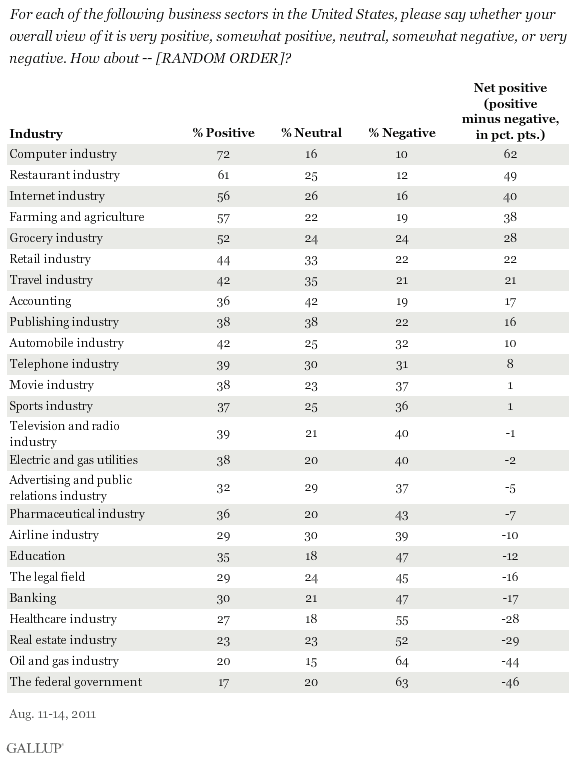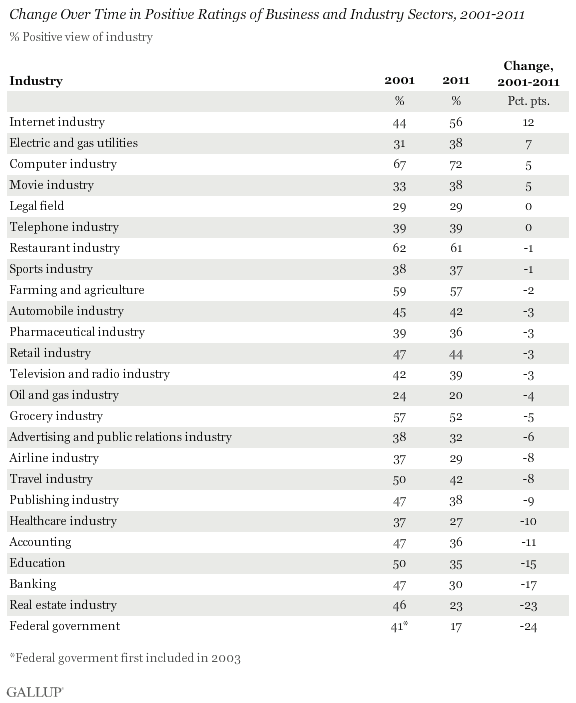Apps for Failed Institutions
2011-10-04
It’s been a rough few years. Our once-great institutions, many built up in the aftermath of World War II, have crumbled. The public has lost faith. Take a look at this recent Gallup poll:

It seems Americans only like two things: technology and food. And they dislike nearly everything else, with Big Oil and the federal government at the bottom of the list. The Gallup poll, covering industry, omits other institutions like higher education, organized religion, and professional sports. But it’s easy to guess how those would fare in a public poll.
Americans have acted out on these frustrations. Politically, there have been wave elections for three consecutive cycles, in starkly different directions. The Tea Party tapped into the stewing anxieties of middle America. And young protesters are now occupying Wall Street, and will soon occupy city centers across the country, in response to unemployment and unchecked corporate dominance.
There are two lessons we software developers can take from the poll above. First, we chose the right profession. Not only are we highly employable, but people actually like us for what we do, at least as much as they like Mario Batali and Chipotle. But second, and most importantly, we have an incredible opportunity to remake society’s institutions through the software and services we can create.
This is a big, ambitious undertaking. The good news is that it’s already happening. Consider banks. Even before the Great Recession, online banks like ING Direct, and online brokerages like E*TRADE democratized personal finance, making it more straightforward. Their presence alone, of course, was not able to stave off financial disaster. They didn’t shake things up enough. Maybe BankSimple will help solve the problem, but it’s likely to be only the tip of the iceberg. We need to fundamentally remake the way we save and invest money, and we need more than one software company to do it.
Healthcare is another failed institution. America spends dramatically more per capita on healthcare than the other Western countries, yet Americans are sicker and die of illness earlier. And despite the rhetoric, the truth is that healthcare will remain a private enterprise no matter what party is in power. It’s time for a drastic rethinking of health insurance, preventive medicine, and personal wellness. And software will have an enormous impact on how we get there. FitBit and MassiveHealth are a start, but again, there needs to be more.
The other industries on the bottom of that list need to be rebooted as well. The bust of the housing market led to the Great Recession. How can we lead people to make responsible decisions about where they live and how they get around? Sure, we may like flying on some airlines like Virgin America or Southwest, but air travel still generally stinks. Is the educational system truly preparing students for life in the 21st century? The Khan Academy is on to something, but they could probably use some help. If a web app can help us connect to old classmates, another web app can surely help us get rid of our dependence on fossil fuel. It just hasn’t had a Mark Zuckerberg to invent it yet.
In the past decade, no institution has fallen out of favor more than the federal government:

It’s a tragedy of democracy.
Everyone has formed an opinion on what exactly is wrong with our government. And many people are working earnestly to fix it. But no one will actually succeed. Why? Because no one has had a novel idea about politics and government in decades. The same old coalitions, the same old parties, the same old advocacy groups are fighting against each other using the same old tactics. The political system is prime for something completely new and different. Something that will come in and fundamentally change the game. It won’t look like anything Washington has seen before. And it’ll certainly be built on top of software. Software that any of us could conceive of and create.
Software developers need to own up to the responsibility of making the world better. No more working on small things. We have a unique skillset that’s perfect for this moment in history. Such endeavors aren’t just the domain of the big thinkers. We don’t need to be invited to TED. All the ideas we need are right in front of us. We live them. We can fire up our favorite text editor, hack away during nights and weekends, and deploy to Heroku for free.
Ideas are out there. Time to build them. Time to change the world.
blog comments powered by Disqus